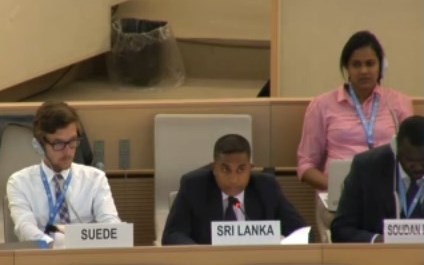
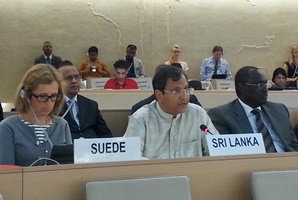
”In contrast to the considerable challenges in the humanitarian crises that continue to engulf many parts of the world today, Sri Lanka’s achievements particularly following the ending of the terrorist conflict provides confidence and hope that even the most severe and insurmountable humanitarian crisis can be overcome, with political commitment.”
Ambassador Ravinatha Aryasinha made this observation during the Interactive Dialogue with the Special Rapporteur on the Human Rights of Internally Displaced Persons in the Human Rights Council on Thursday, 12 June. The Special Rapporteur presented his report to the 26th session of the Council, currently underway in Geneva, pursuant to his mission to Sri Lanka in December 2013 at the invitation of the Government. He undertook several field visits during his mission, where he was provided with unfettered access, to engage with a variety of actors, including civil society.
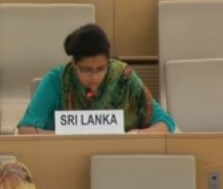
Intervening in the interactive dialogue with the Special Rapporteur on Violence against Women and SR on Extreme Poverty at the 26th UN Human Rights Council in Geneva on 12th June 2014, Sri Lanka said “We believe that in national policy formulation to combat violence against women, it is necessary to focus on gender equality and the empowerment of women to enable them to fully enjoy their human rights and fundamental freedoms. Sri Lanka’s national policy framework, has consistently highlighted the importance of gender equality and taken measures to alleviate any existing gender gaps”.
Intervening in the interactive dialogue with the Special Rapporteur on Right to Health and WG on Human Rights and Business at the 26th UN Human Rights Council in Geneva on 11th June 2014, Sri Lanka has said “Multi-sectoral approach should be used to address diet-related Non-Communicable Deceases (NCDs) and to increase availability of healthier food alternatives through policy formulation. While providing information about the ill effects of unhealthy foods and raising awareness of the benefits of balanced diets and healthy foods, States should take steps to implement health education programmes to promote healthy food options in such institutional settings such as schools”.
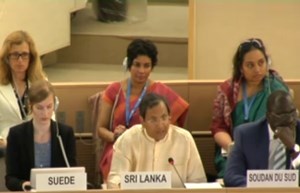
Sri Lanka has reiterated its categorical rejection of the Human Right Council Resolution 25/1, and said it will not cooperate with the OHCHR-driven so called “comprehensive investigation” emanating from it. Sri Lanka has observed that the Government is firmly committed to continuing its ongoing processes of reconciliation, nation building and accountability, and towards this end, will continue to work with countries and intergovernmental and non-governmental organizations that are genuinely interested in the welfare of the Sri Lankan people.
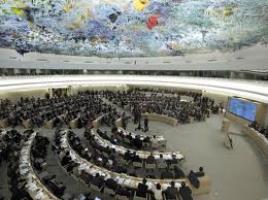
Sri Lanka’s efforts at achieving national reconciliation and significant progress in many spheres received support from countries in Asia, Africa and Latin America during the adoption of the resolution on 27 March 2014 and consideration of the High Commissioner's Report on Sri Lanka on 26 March 2014 at the Human Rights Council.
China said “the international community must respect the right to choose one’s own path of development.” They also pointed out that the co-sponsors of the draft resolution on Sri Lanka “used the problem of human rights to openly exert pressure on Sri Lanka” to intervene in the internal affairs of the country.” China shared the concerns of many other countries that “this resolution does not reflect the consensus of the Council” and it is “an example of politicization of human rights” and at the same time “some of the contents of the draft goes against the mandate of the High Commissioner and provision of the resolution which established the Council.”
- Countries supporting US-led action against Sri Lanka are now a minority in the HRC - Amb. Aryasinha
- Sri Lanka says Resolution driven by the electoral compulsions of some States at the behest of elements with links to the LTTE
- Ambassador Aryasinha says request to the Office of the High Commissioner to undertake a comprehensive independent investigation reflective of partisan politicised agenda
